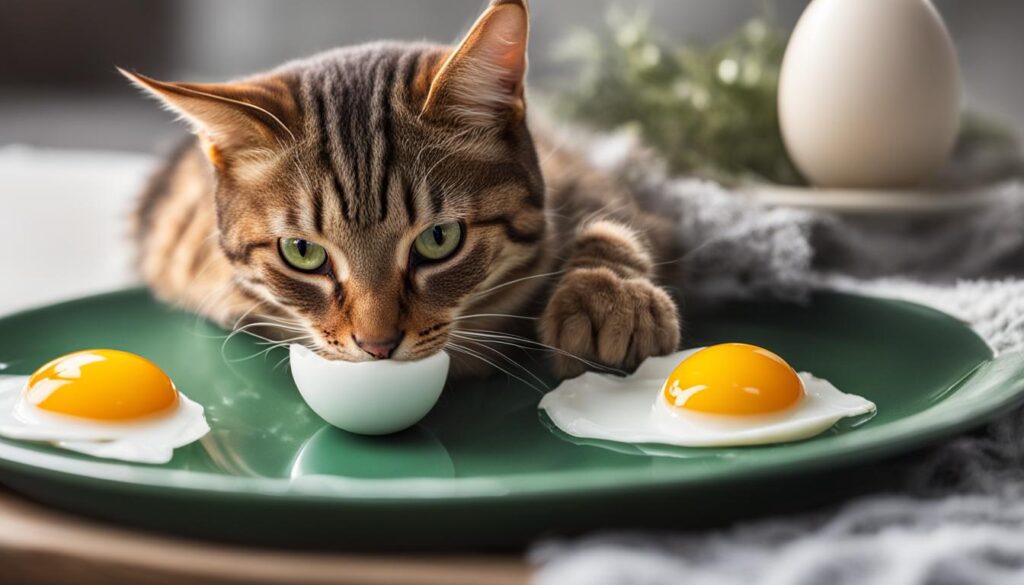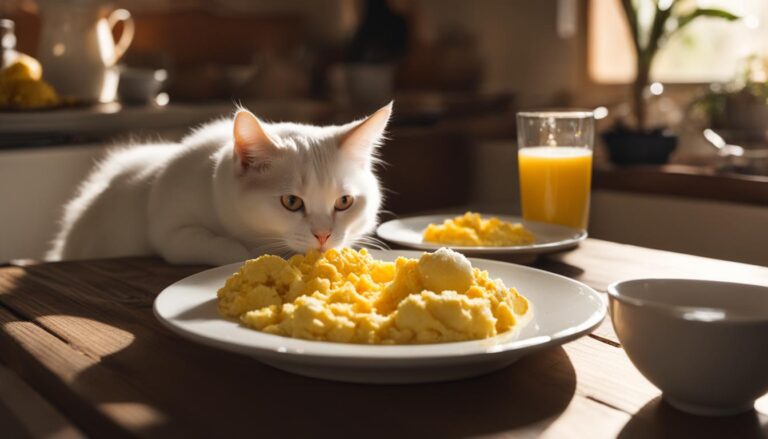When it comes to feeding our furry companions, we want to make sure they have a balanced and nutritious diet. You may have wondered if cats can eat eggs and if it’s beneficial for them. In this article, we’ll explore the truth about cats and eggs, including their nutritional value, potential benefits, and any risks involved. We’ll also provide guidance on how to safely incorporate eggs into your cat’s diet. So, let’s crack open the topic and find out if eggs are a good choice for your feline friend!
Belangrijkste opmerkingen:
- Feeding eggs to cats can provide them with essential animal protein, animal fat, vitamins, and minerals.
- There is no scientific evidence that cats specifically benefit from egg proteins, and their digestive systems may not process the nutrients in eggs as effectively as a meat-based diet.
- Raw eggs can harbor harmful bacteria like salmonella and listeria, posing a risk to cats’ gastrointestinal health. Cooked eggs are a safer option.
- When feeding eggs to cats, it’s important to cook them thoroughly, avoid seasoning, and offer them in moderation to prevent potential complications.
- While eggs can be a nutritious addition to a cat’s diet, they should be introduced gradually and in small amounts. Consult with a veterinarian for guidance on your cat’s specific dietary needs.
The Potential Benefits of Feeding Eggs to Cats
Eggs can offer several potential benefits to cats when incorporated into their diet. They are a valuable source of animal protein, which plays a crucial role in muscle development, skin and coat health, and organ maintenance. Protein also aids in the production of enzymes, hormones, and antibodies necessary for various bodily functions. Additionally, eggs contain animal fat, which provides cats with energy and essential fatty acids that support cell membrane structure and help regulate inflammatory responses.
Furthermore, eggs are rich in vitamins and minerals that contribute to cats’ overall well-being. They are particularly high in vitamins A, B2, B5, and B12, which are vital for maintaining healthy eyesight, promoting a strong immune system, aiding in energy production, and supporting brain function. Eggs also contain important minerals like iron, phosphorous, selenium, and choline, which play key roles in proper organ function, cell growth, and nerve function.
While these nutrients can be obtained from a well-balanced meat-based diet, incorporating eggs into a cat’s meals occasionally can provide additional nutritional benefits. However, it is essential to note that every cat’s dietary needs may vary, and consulting with a veterinarian is recommended to ensure an appropriate and balanced diet for your feline friend.
| Nutrients in Eggs | Voordelen |
|---|---|
| Animal Protein | Promotes muscle development, skin and coat health, and organ maintenance |
| Animal Fat | Provides energy and essential fatty acids for cell membrane structure and regulating inflammatory responses |
| Vitamins A, B2, B5, B12 | Supports eyesight, immune system, energy production, and brain function |
| Iron, Phosphorous, Selenium, Choline | Aids in organ function, cell growth, and nerve function |
While the nutritional value of eggs for cats is evident, it is crucial to feed eggs safely and in moderation. The next section will discuss the potential risks associated with feeding eggs to cats and how to mitigate them.
| Cooking Method | Nutrient Retention | Taste |
|---|---|---|
| Boiled | Hoog | Mild |
| Scrambled | Medium | Rich and creamy |
| Fried | Low | Golden and crispy |
Table: Nutritional Comparison of Different Cooking Methods for Eggs
Eggs in Cats’ Diet – Cat-Friendly Recipes
Adding eggs to your cat’s diet can provide them with additional nutrients and variety in their meals. However, it’s important to introduce eggs gradually and in small amounts to ensure that your cat tolerates them well. Here are some cat-friendly recipes that incorporate eggs:
Egg and Tuna Mix
This simple recipe combines the benefits of eggs and tuna, which is also a good source of protein for cats. Mix a boiled egg with a small can of tuna in water (drained) and mash it together. You can serve this mix as a topping on your cat’s regular food or as a special treat.
Egg and Chicken Stew
If you prefer to cook a warm meal for your cat, you can try making an egg and chicken stew. Boil a chicken breast until cooked through, then shred it into small pieces. In a separate pot, boil an egg until hard-boiled and chop it into small chunks. Combine the chicken and egg in a stew-like consistency using low-sodium chicken broth. Allow it to cool before serving to your cat.
Veggie and Egg Omelette
If your cat enjoys vegetables, you can make a veggie and egg omelette. Whisk together one egg and add finely chopped cooked vegetables such as carrots, peas, and spinach. Cook the mixture in a non-stick pan until the omelette is set. Cut it into small squares and serve as a nutritious snack for your feline friend.
Remember, when introducing new ingredients to your cat’s diet, it’s important to monitor their reaction and consult with a veterinarian if you have any concerns. Always use high-quality, fresh eggs from reputable sources to ensure the safety and nutritional value of the eggs you feed your cat.

Conclusie
In conclusion, the question “Can cats eat eggs?” can be answered with caution. While eggs do offer some nutritional benefits to cats, it is important to consider the risks and benefits before incorporating them into their diet.
Eggs are a good source of animal protein, vitamins, and minerals, which are essential for cats’ overall health and well-being. However, there is no scientific evidence that cats specifically benefit from egg proteins, and their digestive systems may not be optimally equipped to process the nutrients in eggs.
Therefore, it is advisable to prioritize a well-balanced, meat-based diet for cats, as this diet provides all the necessary nutrients they need. Eggs can be offered to cats as occasional treats, but it is crucial to cook them thoroughly to eliminate the risk of harmful bacteria, such as salmonella and listeria. Cooked eggs should be served plain, without any seasoning or additives, to ensure the safety and nutritional value for cats.
Consulting with a veterinarian is always recommended to address the individual dietary needs of your cat. They can provide personalized guidance based on your cat’s age, health condition, and nutritional requirements. By making informed decisions and prioritizing your cat’s well-being, you can ensure that eggs, when safely prepared and fed in moderation, can be a beneficial addition to your cat’s diet.




